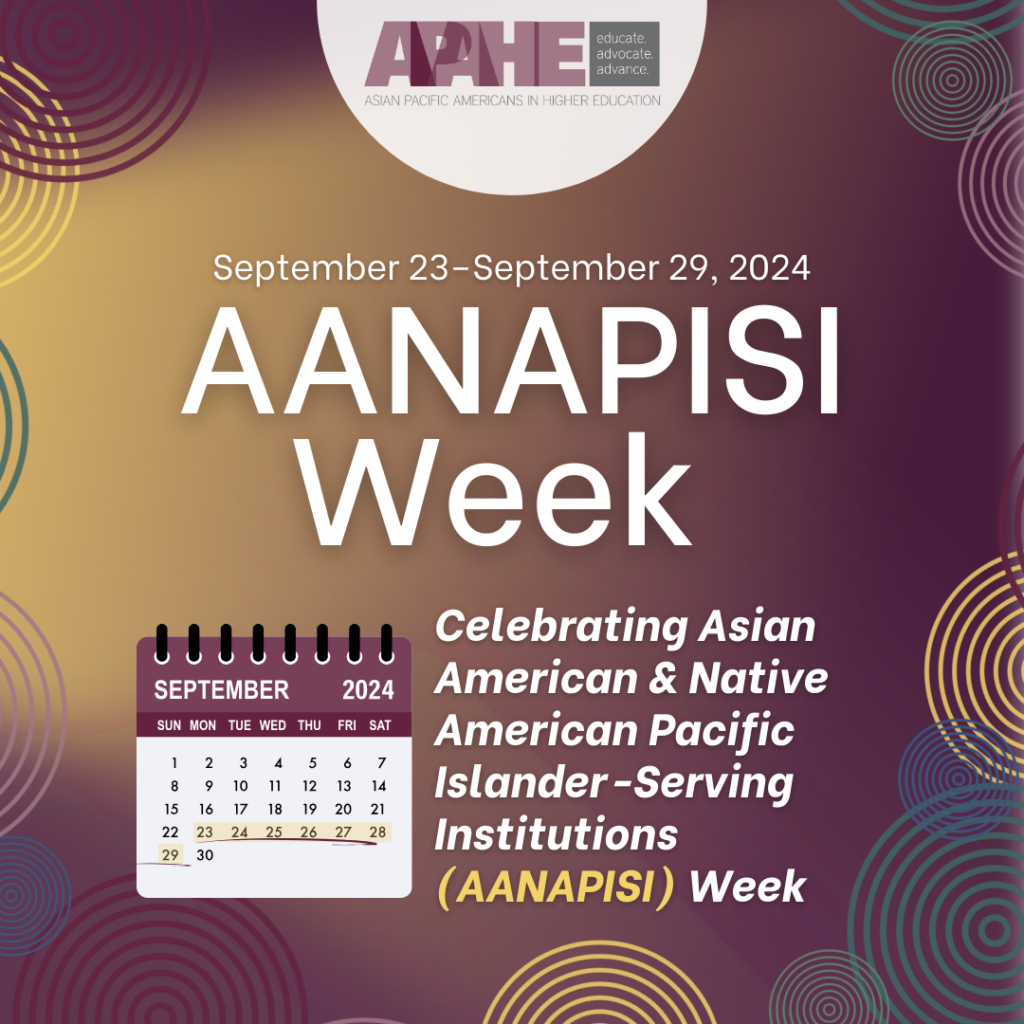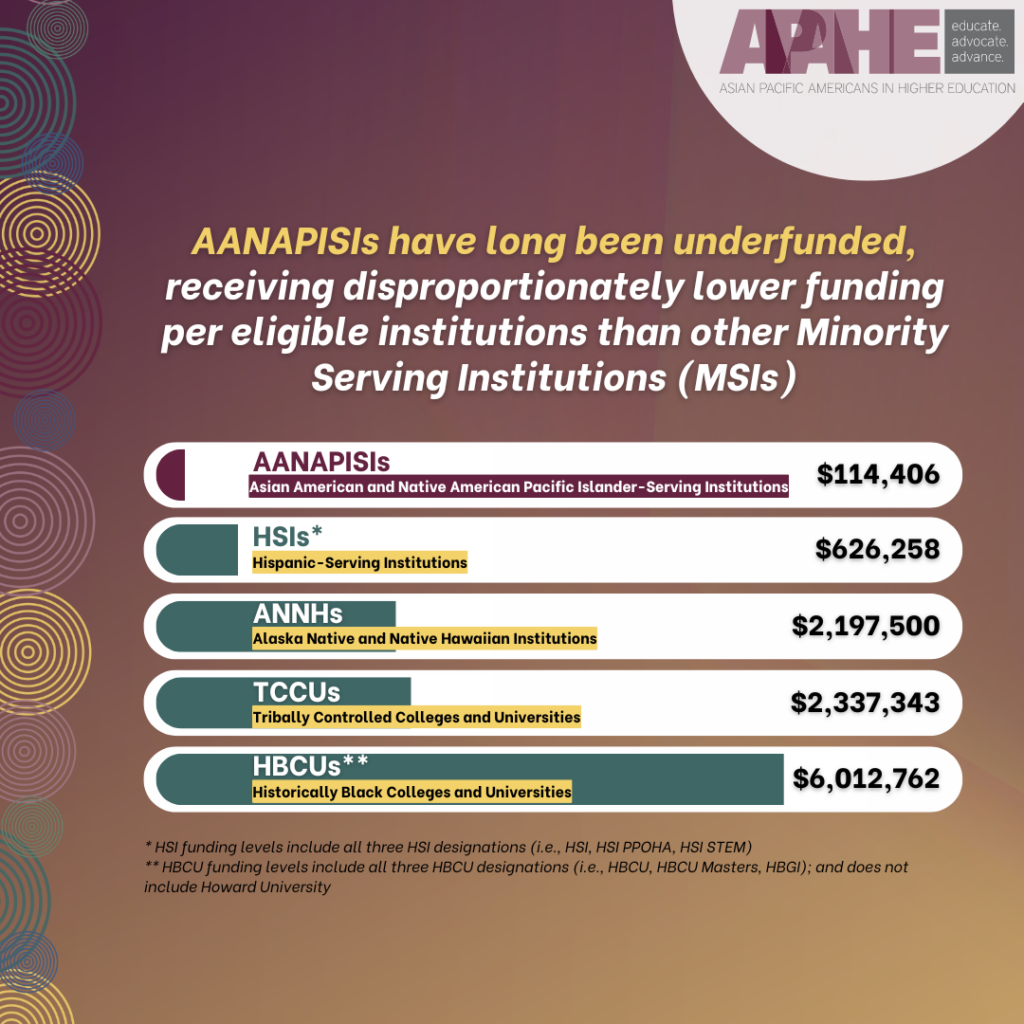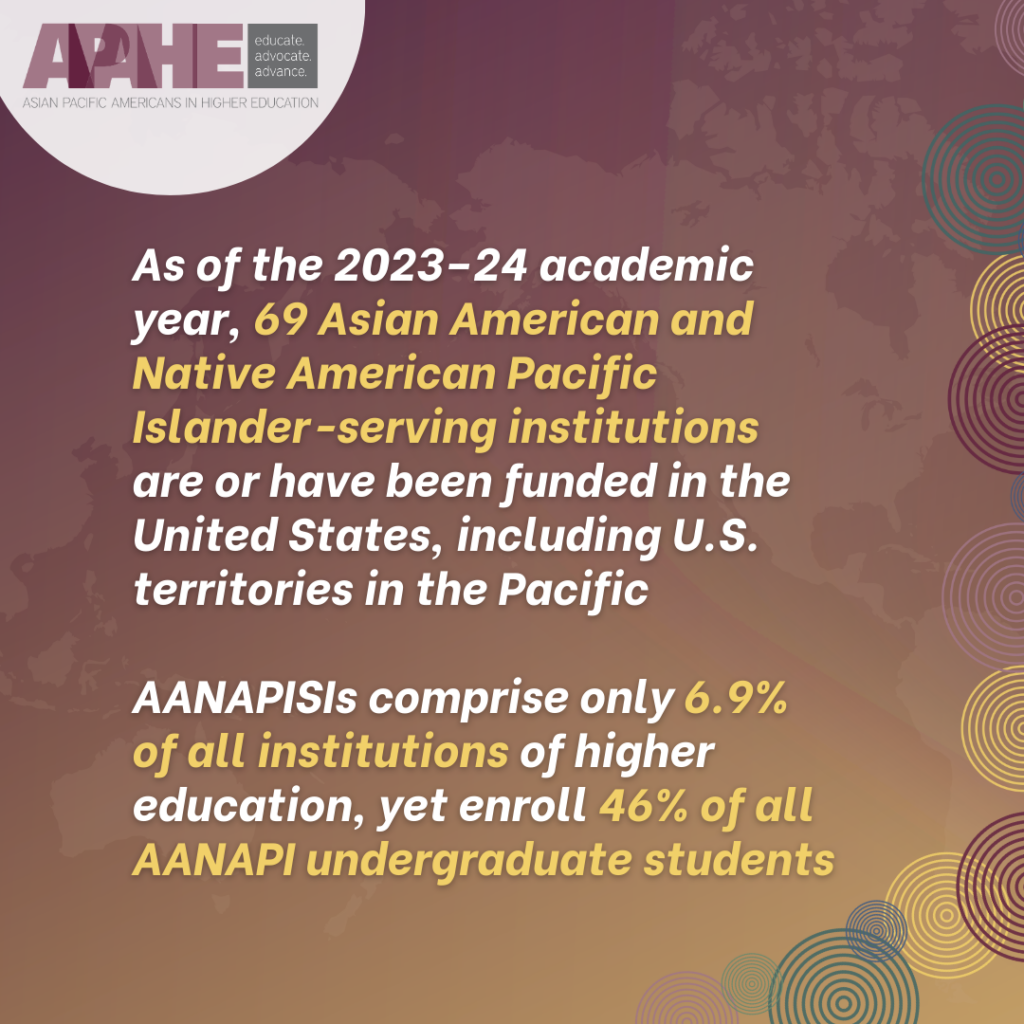The resource and information below are provided by Asian Pacific Americans in Higher Education (APAHE).
What is AANAPISI Week?
We are excited to spread the word about AANAPISI Week (September 23–September 29, 2024). This week celebrates the Asian American and Native American Pacific Islander-Serving Institutions (AANAPISI) designation, which was established by Congress on September 27, 2007, to improve the availability and quality of postsecondary education programs to support low-income, first-generation Asian American, Native Hawaiian, and Pacific Islander (AANHPI) students.
AANAPISI Week commemorates the significance and achievements of AANAPISIs and allows organizations and institutions to celebrate the educational support of underserved AANHPI students. Our goal this year is to:
- Raise awareness and highlight the impact of AANAPISIs on AANHPI student success
- Expand our network of advocates and supporters
- Develop federal policy champions in support of AANAPISIs and our students
As we seek to build visibility around the impact of these important institutions, we invite our partners to learn more about AANAPISIs, and circulate information about AANAPISI Week to those in their networks who are interested in learning more and supporting AANHPI student success.



Federal Policy Landscape
Funding for AANAPISIs has expanded significantly since Congress established this Minority-Serving Institution (MSI) designation in 2007. While Part F funding has consistently remained at $5 million annually, appropriations for Part A have grown from $2.5 million in 2009 to $18.68 million in 2024, largely thanks to the grassroots organizing and advocacy of the AANHPI higher education community.

Despite these increases, funding for AANAPISIs remains flat for FY2025, with a Democrat-led Senate and Republican-controlled House. Beyond funding, AANAPISIs face several policy challenges. One of the most pressing is the “multiple designation” issue, where an institution can only receive one Part A grant at a time, forcing different MSI designations to compete against each other.
Additionally, AANAPISIs have yet to be fully recognized by several federal agencies (e.g., the National Endowment for the Humanities, National Science Foundation, etc.), which do not offer dedicated opportunities or grants for AANAPISIs, as they do for other MSIs.

It is more important than ever for the AANAPISI and AANHPI communities to ensure that Congress, the White House, and executive agencies understand and support the unique educational needs of our students and the institutions that serve them. Addressing these policy challenges is crucial to ensuring that AANAPISIs can provide vital resources to first-generation, low-income AANHPI students, transforming the trajectory of their futures.
We invite you to join us in strengthening the AANAPISI designation and its mission to provide equitable opportunities for AANHPI students. By standing together and advocating for AANAPISIs, we can ensure that Congress, the White House, and federal agencies continue to invest in AANAPISIs and support the success of AANHPI students.
Call to Action: How to Engage
- Spread the word on social media
Promote and share AANAPISI Week content using the graphics, captions, and hashtags below. - Share your story
We invite you to share why you, your institution, organization, or students support AANAPISIs. Be sure to include the hashtags #AANAPISI and #AANAPISIWeek in your post, and tag APAHE so that we can reshare your post on our social media channels!
APAHE Social Handles: X @APAHENATIONAL and Instagram @apahenational
Join our Facebook Group https://www.facebook.com/groups/apahe and LinkedIn Group https://www.linkedin.com/groups/4309232/
- Have your Institutional or Organizational Governing Boards pass a resolution on AANAPISI Week
We invite you to have your institution/organization’s Board of Governors/Directors pass a resolution to recognize and support AANAPISI Week, AANHPI communities, and Student Success Programs that serve AANHPIs. See Resolution Template here
- Send a letter to your U.S. Representative and Senators
We encourage you to contact your Member of Congress to urge them to support increased funding for AANAPISIs? You can also sign on to our email list, [email protected], to receive advocacy resources from the APAHE team.

Additional Resources
Interested in learning more about AANAPISIs? We invite you to check out the resources below, and share them with your networks:
AANAPISI Program Basics:
AANAPISI Overview:
- APAHE AANAPISI Webpage https://tinyurl.com/AANAPISI-2024
- The Minority Serving Institutions Data Project – https://www.msidata.org/
- Ensuring College Access and Success for AANHPI Students (2024). https://collegecampaign.org/publication/ensuring-college-access-and-success-for-asian-american-native-hawaiian-and-pacific-islander-students
Academic Literature:
- Espinoza, K. J. C., Rincón, B. E., Drake, B. M., Harbin, J. J., & Ethelbah, K. (2024). Oceania in the desert: A QuantCrit analysis of the (under)counting of Native Hawaiian and Pacific Islander Students at an AANAPISI-HSI. Journal of Research on Educational Effectiveness. https://doi.org/10.1080/19345747.2024.234967
- Fong, T., Maramba, D., Nguyen, M.H. (Eds.). (2022). Models of Change: Asian American and Native American Pacific Islander Serving Institutions in Action. AAPI Nexus Journal, 19(1/2). http://www.aapinexus.org/2022/03/28/models-of-change-aanapisis-in-action-spring-2022/
- Gogue, D. T.-.L., Venturanza, R. J., Cuenza-Uvas, A., & Nguyen, M. H. (2021). The role of Asian American and Native American Pacific Islander-Serving Institutions in reframing leadership education. New Directions for Student Leadership, 171, 101–111. https://doi.org/10.1002/yd.20460
- Nguyen, M.H., Ramirez, J., & Laderman, S. (2023). What counts as a Minority-Serving Institution?: Toward the utilization of a standardized and uniform definition and typology. Educational Researcher, 52(3), 174-179. https://doi.org/10.3102/0013189X221105861
- Nguyen, M.H. (2023). Expanding the capacity of student affairs professionals and faculty: A case study of two Asian American and Native American Pacific Islander-Serving Institutions. Journal of Student Affairs Research and Practice, 60(4), 447-462. https://doi.org/10.1080/19496591.2022.2144740
- Nguyen, M.H. (2024). Serving Asian American, Native Hawaiian, and Pacific Islander students: Examining how Asian American and Native American Pacific Islander- Serving Institutions build students’ capacities. The Review of Higher Education.. https://doi.org/10.1353/rhe.0.a925900
- Nguyen, M.H. (2022). Building capacity for student success at Asian American and Native American Pacific Islander-Serving Institutions (AANAPISI): Transforming the educational experiences of Asian American and Pacific Islander Students. The Journal of Higher Education, 93(4), 503-531. https://doi.org/10.1080/00221546.2021.1996170
- Nguyen, M. H., Espinoza, K. J., Gogue, D. T.-L., & Dinh, D. M. (2021). AANAPISIs in context and practice: Strategies for serving Asian Pacific Islander Desi American Students. About Campus, 26(1), 5–9. https://doi.org/10.1177/1086482221994121


